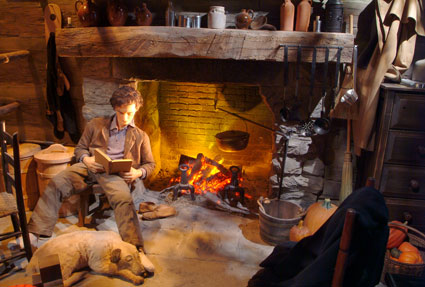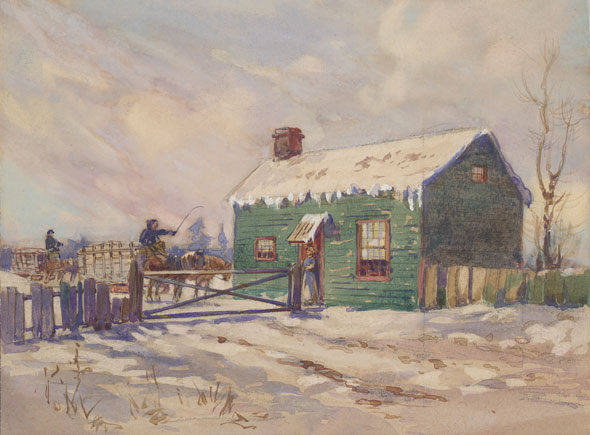
One Of The Boys
A little boy one winter morn trudged along a country road to school.
The school was a long way off; and the wind blew cold over the prairie. It was a little school house, a brown patch against a gray sky, the fields, bare and wide, stretching each side of it for miles. The wind bent the branches of a tall oak just in front, a snow flake hurried here and there through the air, and a flock of crows in the oak called, ”Caw, caw, caw!”
He was a little fellow, only ten. The books he carried under his arm, were the English Reader, Daboll’s Arithmetic, and Webster’s Spelling Book; and he had a roll of foolscap paper and a quill pen. He had a dinner basket, too. The cold wind whistled about his ears, but he marched bravely on. What cared he for the cold! His clothes were of the warmest, if they were odd. His coat and trouser were made of buckskin, his cap of coonskin.
You would have thought it a queer schoolhouse. It was a log house with small windows, and had only one room, with desks against the four sides of the wall; or rather, one long desk reaching all the way round the wall. Before this were place long, high benches, without any backs. A large box stove and a teacher’s desk with very long legs, looking some like a daddy long legs, was the only other furniture in the room. On one of these high benches, with his legs dangling down, this boy seated himself, after he said ‘good morning’ to the master, hung up his cap, put away his dinner basket. His cheeks were glowing rosy red from the long walk in the wind, and his eyes were keen and bright, ready for fun or study either.
He studied his arithmetic first thing. The “sums” as they used to call the examples then, were long and hard, and it often took hours of puzzling, before he could see his way through the knotty problem, and “get the answer;” or Mr. Crawford, the teacher, would not lift his finger to help one of his boys and girls until he was quite sure they had tried their very best to help themselves. But Abraham—that was this boy’s name—was not of the kind that wished for help. He never like to give up beaten, but would stick to the toughest examples until he mastered it.
That night, when he went home, he carried a prize with him. The teacher lent him the life of Washington.
Books were scarce in that new western town, and if there was one thing in the world that Abraham loved, it was reading.
He could hardly wait till he had his chores done after getting home, he was in such a hurry to begin that new book bound in leather. Well, the chores were done at last, supper was over, and he was in the chimney corner eagerly reading his book. When he went to bed, he laid it carefully on the shelf, in a good safe place, he thought. He did not notice, though, that a huge crack between the logs was just above it. If he had noticed, he would not have thought that in the night a terrible storm of wind and rain would come up, and that the rain would come driving right in on that new borrowed book. That is the very thing it did, though. In the morning, when Abraham went to get it, it was soaked through and through. Now what was to be done? Should he dry it and straighten it out, and make it look as well as he could, then slip it back in the master’s desk and say nothing, and let him think something happened to it in the desk?
Satan whispered, probably, that he might as well not do so. But this honest boy did no such thing; he tool it at once to Mr. Crawford and told him the whole story. He offered, besides, to pay in work for the harm done to the book. Mr. Crawford had a little farm and plenty of work to do, so he told him if he would pull corn stalks for him three days, the book should be his. Abraham was delighted. The book was not injured so but that when it was nicely dried, it could be read as well as ever.
Do you know that this same boy who wore the buckskin coat and the coonskin cap, and who was honest and true, became the president of the United States, the noblest, best man, next to Washington, that ever sat in the White House, and that he was Abraham Lincoln? I think the name “Honest Abe” was given to him very far back, don’t you? An honest boy, as a rule, makes an honest man.
The Pansy
